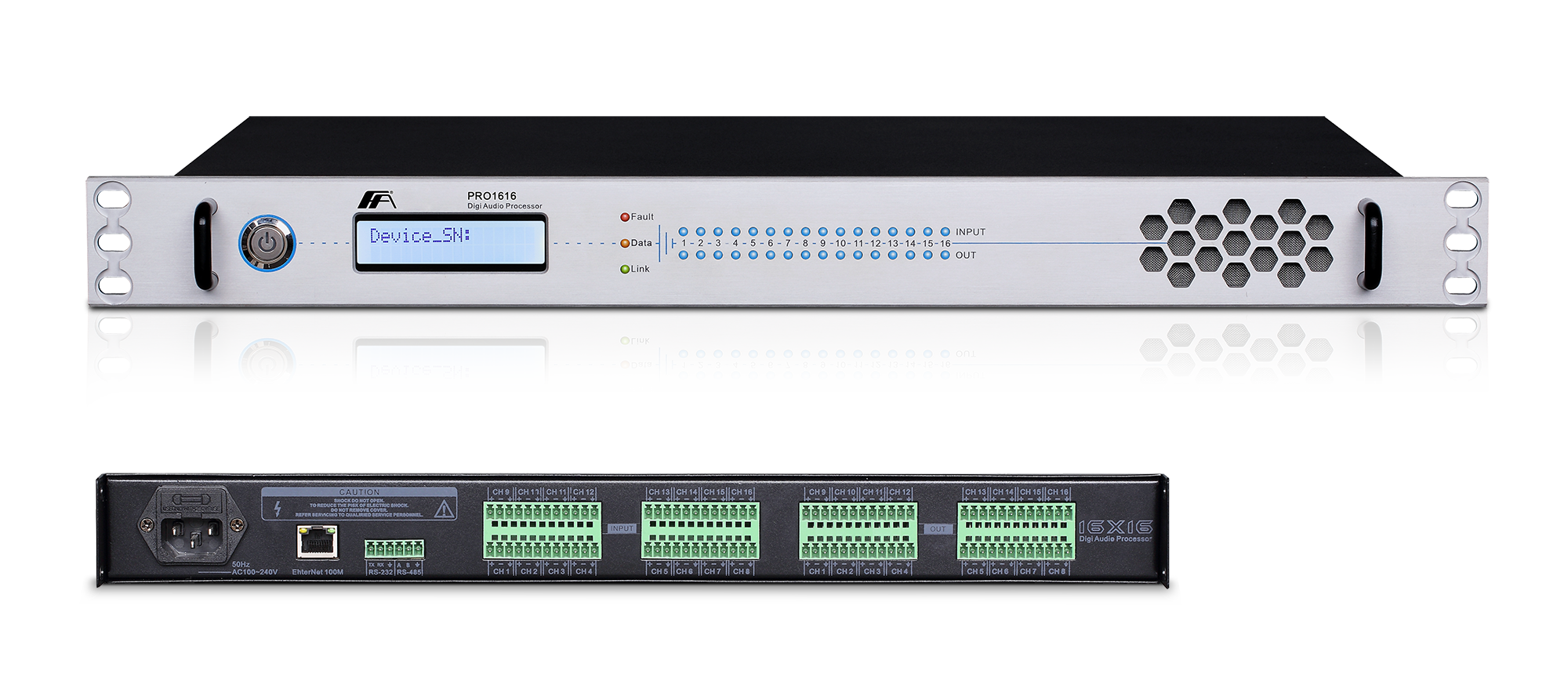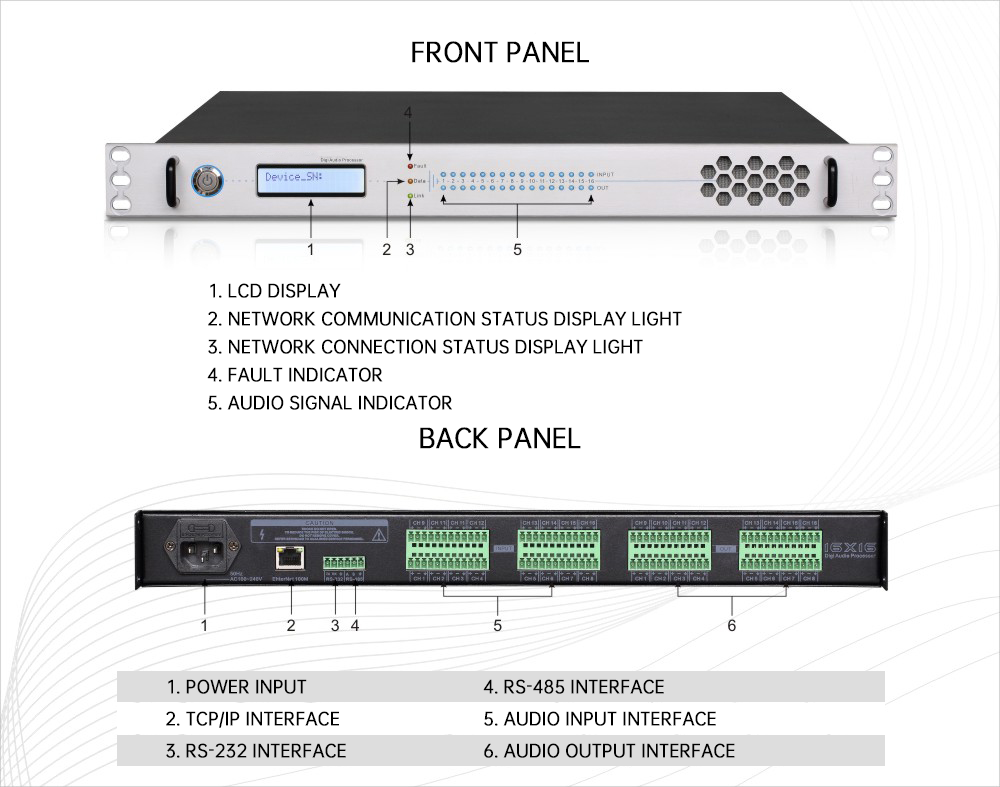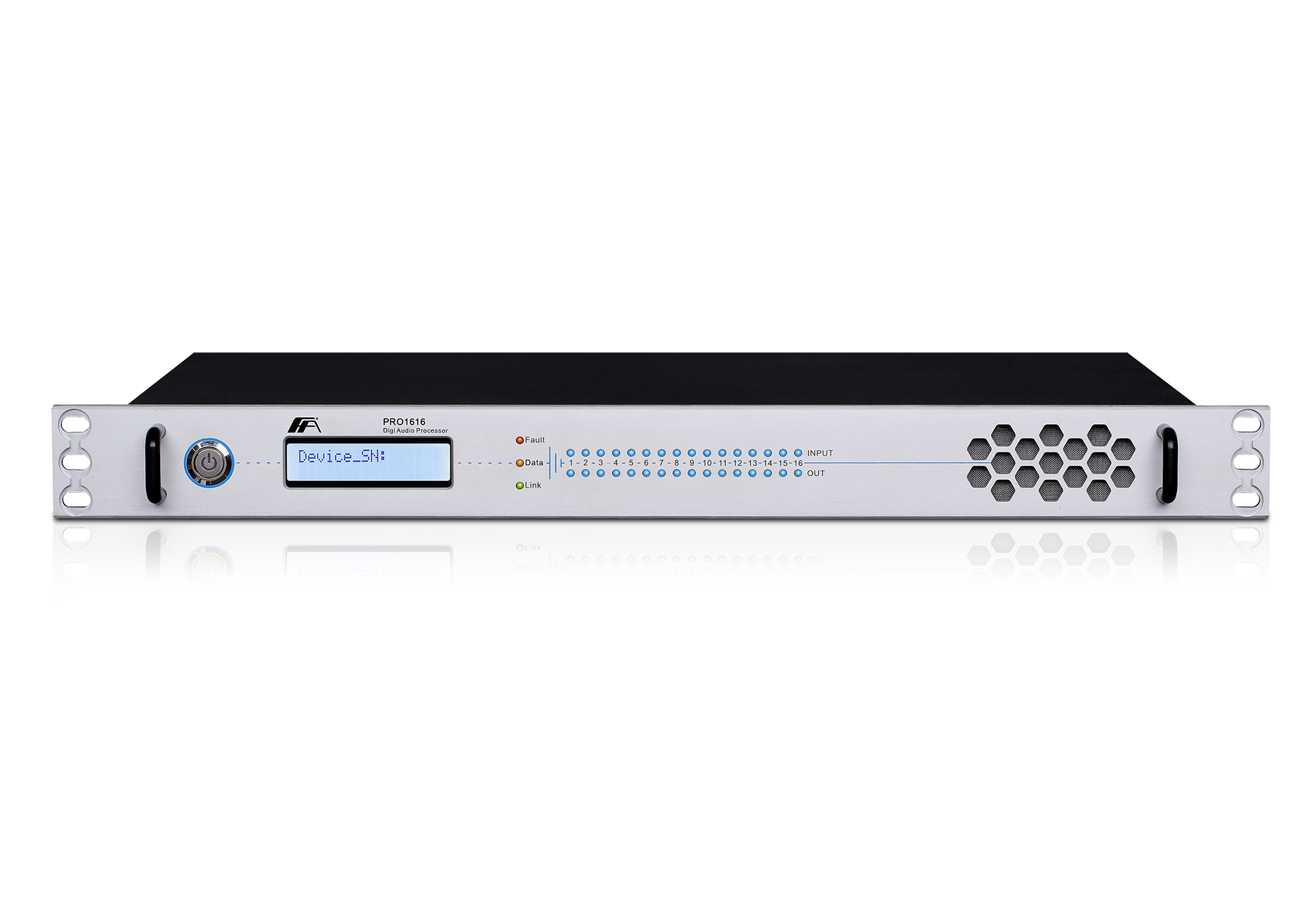
PRO1616 Network-based digital audio matrix
The PRO-1616 is a powerful 16-in, 16-output digital audio processor powered by ADI SHARC’s fourth-generation ADSP-21489 floating-point audio DSP chip, providing the highest performance 400 MHz/2200 MFLOP processor capability. Ultra-low noise floor pre-amplification circuit, low distortion analog circuit, 114dB audio AD, DA, provide high-quality sound quality for the scene. The front panel of the device must have a volume status display, which can display all input 16 and output 16 channel volume status; The LCD display on the front panel of the device can display the current IP address of the device, the preset number and preset name of the processor in a loop, so that when there are multiple processors in the system, the administrator can quickly identify and distinguish the current processor. The front panel has a network connection status indicator, an error alarm indicator, and a flashing red alarm when there is a serious error.
Powerful DSP processor capabilities
Based on the ultra-powerful ADSP-21489 ultra-powerful DSP processing power, and based on our unique core DSP method, the built-in independent 16-channel extremely low distortion adaptive feedback suppressor, 16-channel noise gate, 16-channel input voltage limiter, 16-channel 16-segment PEQ, 16-channel input 48dB slope high-pass-low-pass filter, and 16-channel 1-second delay mean that you can make precise and careful settings for each input audio channel. 16×16 full matrix mixing, for free mixing of any input channel. Each of the 16 output channels has independent 16-segment PEQ, voltage limiter, 48dB slope high-pass-lowpass, and 2-second delay.
Built-in sine wave, pink noise, white noise signal generator. 32 Presets can be stored.
Rich audio channels and control interfaces:
1 TCP/IP, 1 RS-232 port, 1 USB communication port, open third-party control protocol. It can meet the needs of a variety of large, medium and small professional audio projects. It can meet the application needs of theaters, concert halls, remote video conferences, stadiums, churches, conference centers, theme parks and other public sound reinforcement systems.
LCD screen status display:
The 1602 LCD screen on the front panel displays important information such as IP address, current preset name, and usage time
Easy-to-use control software:
Through senior sound engineers and professional tuners, we have in-depth communication with the operation habits of debugging and application personnel, and developed a software interface that conforms to industry applications. The control software is easy to understand and can be quickly operated without manuals. Each input value can be directly entered on the keyboard to get the exact value you want, such as – 12. 2dB Direct Input – 12. 2。 The volume fader operates Shi ft + to select the channel, press the up and down arrow keys on the keyboard, and you can achieve 1dB steps and step decreases. For complex parameter adjustments such as PEQ and Li miter, the parameters can be quickly copied and pasted, and you can easily realize multi-channel data copying, which is convenient to operate.
Open RS-232, TCP/IP communication protocols
Realize third-party equipment to control the volume, call mode, set mute, and be able to read the pre-mixing level meter and post-mixing level meter in batches through TCP/IP protocol, which is convenient for third-party software integration.
Features:
- High-performance floating-point DSP processing chip;
- 16 channels of balanced input audio channels
- 16 channels support MI C input
- Each MIC input supports 48V phantom power
- 16 balanced audio output channels
- 16 channels of independent adaptive feedback suppressor
- 16-channel automixing
- ADC CS5368 114dB dynamic
- AC CS4385 114dB dynamic
- Inputs per channel: Preamp, Noise Gate, Compressor, 16-Band Parametric EQ, Delay, Automixer
- Outputs per channel: 16-band parametric equalization, crossover, high- and low-pass filter, limiter, delay
- Built-in Signal Generator: Sine Wave Signal, Pink Noise, White Noise,
- Front panel 1602 display shows IP address, current preset
- Open RS-232, TCP/IP protocol to achieve third-party control
- There is camera tracking code output, which is convenient to realize the camera linkage function through the third-party central control
- Support 32 sets of scene preset functions, which can be called through TCP/IP and RS-232 protocols
It can be connected to the Android system and supports smartphone or tablet control software package.
Specifications
Audio input: 16~32 balanced inputs, phoenix plug
Nominal input level: +4 dBu line or -40 dBu microphone level
Microphone pre-amplification gain: 0-40 dB analog gain, 20dB digital gain
Maximum input level: +20dBu
Input impedance: >5 kΩ balanced, > 3kΩ unbalanced
Common Mode Rejection Ratio (CMRR): >70dB @ 1 kHz
Preamplification Equivalent Input Noise (EI N): <-125 dBu, 2 2Hz – 22kHz
Phantom power: +48 V DC
Audio output: 8~20 balanced line levels, phoenix plug
Nominal output level: 0 dBu line level
Output impedance: 600 Ω balanced
DSP frequency, processing capacity: 400Mhz, 400MIPS, 2200 MFLOPs
Sampling frequency/quantization: 48 kHz, 24 Bi t ADC, 24 Bi t DAC
Frequency response: 20 Hz – 20 kHz, + /- 0. 5 dB
Dynamic range: 114 dB, ADC, DAC
Total Harmonic Distortion: <0.01%;20Hz~20kHz@+4dBu Inter-channel crosstalk: >-80 dB @ 1 kHz, typical
Device dimensions WxDxH: 1U, 482 mm x 464mm x 44mm
Power supply: 100~240VA, 50/60 Hz, 75W




